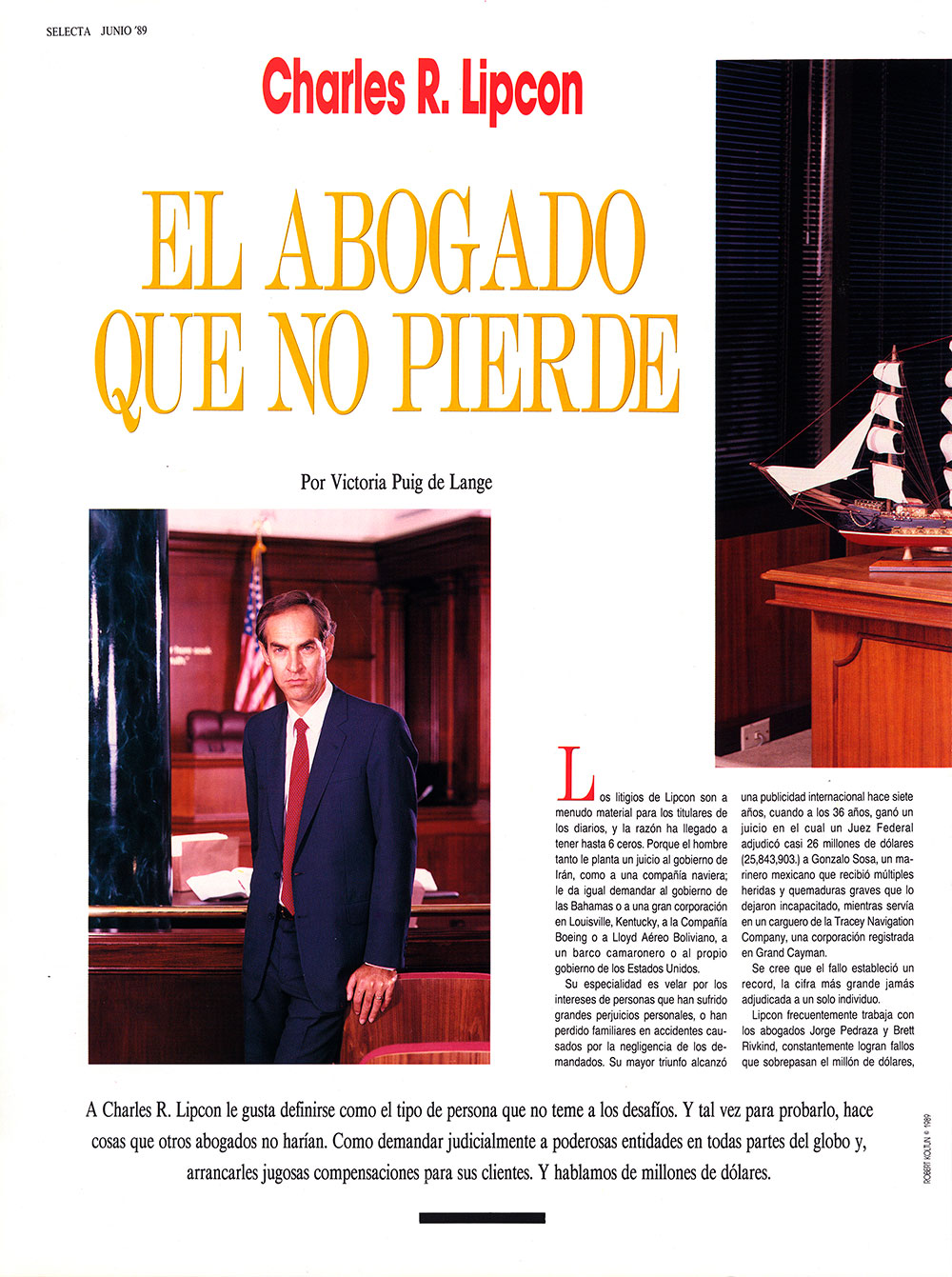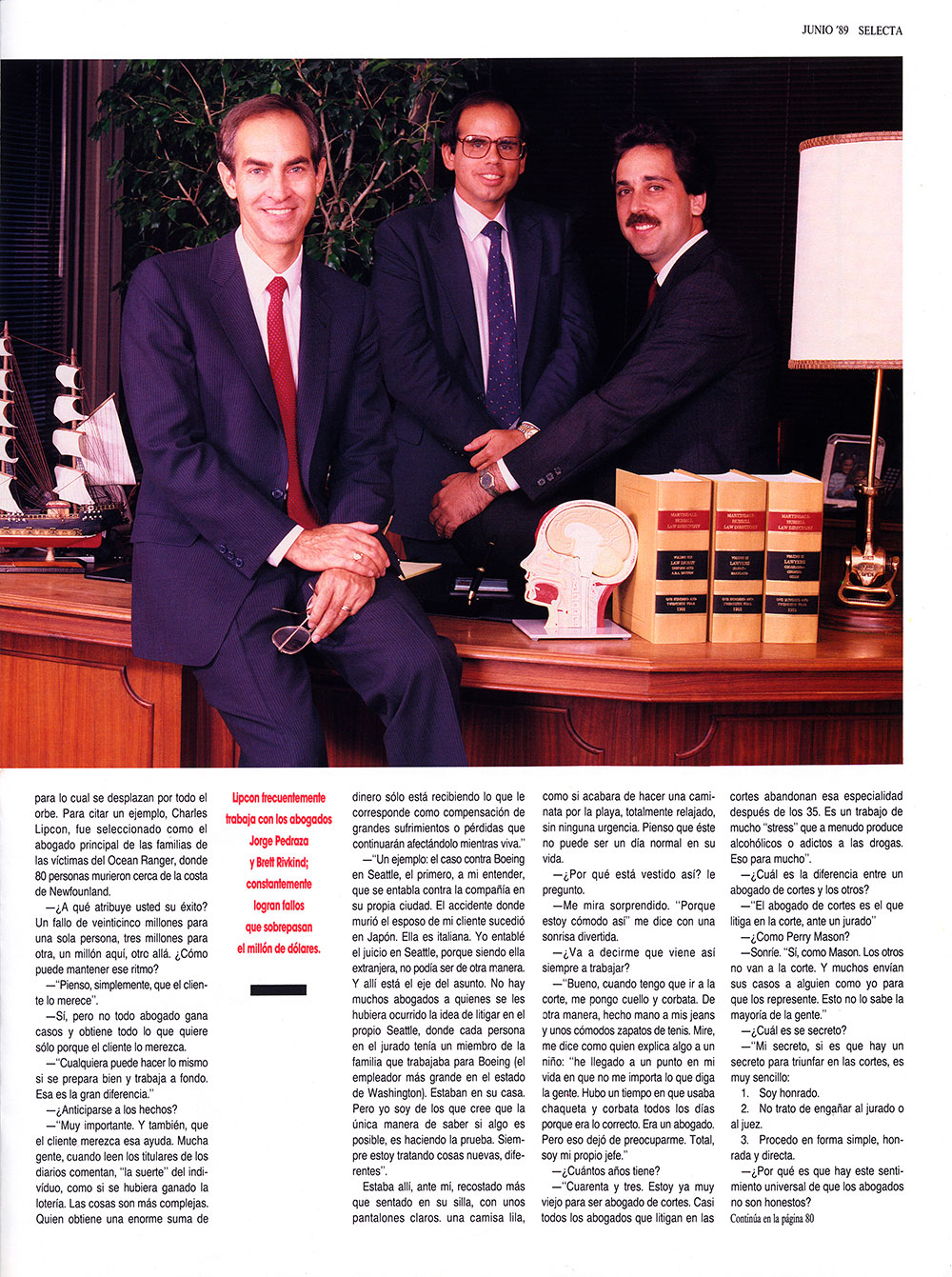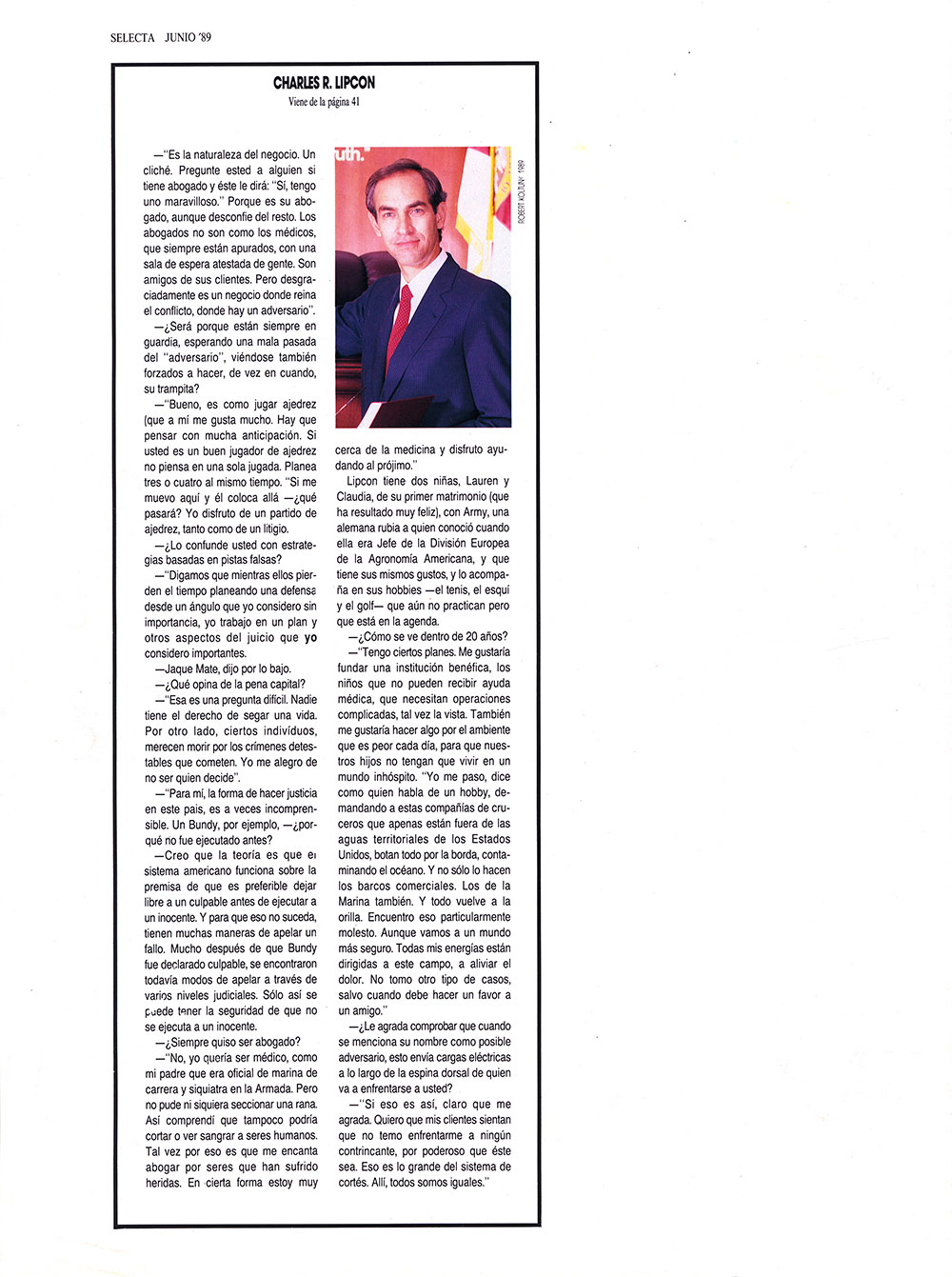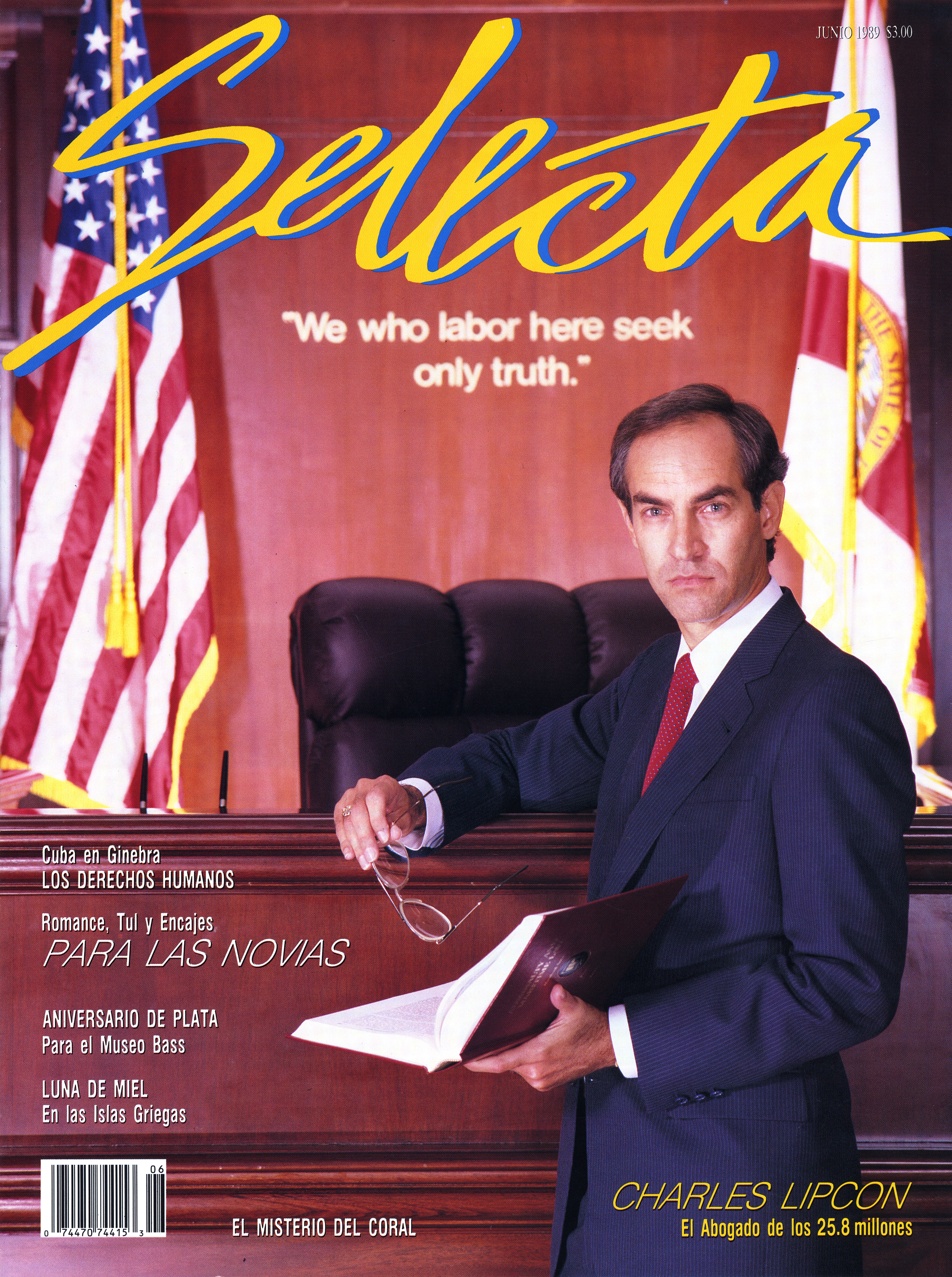Charles R. Lipcon likes to describe himself as the type of person who does not fear challenges. And perhaps to prove it, he does things that other attorneys would not do. Like suing powerful entities all over the world and wrestling from them juicy awards for his clients. And we are talking about millions of dollars.
Lipcon‘s lawsuits are often the subject of newspaper headlines, and the reason is that they have been for amounts having up to 6 zeros. Because the man is just as likely to file suit against the government of Iran, as against a shipping company; it is all the same to him to sue the government of the Bahamas or a large corporation in Louisville, Kentucky; Boeing Company or Lloyd Aereo Boliviano; a shrimping boat or the United States government itself.
His specialty is safeguarding the interests of persons who have suffered great personal injuries, or who have lost relatives in accidents caused by the negligence of the defendants. His greatest victory received international publicity seven years ago when, at age 36, he won a lawsuit in which a Federal Judge awarded close to 26 million dollars ($25,843,903) to Gonzalo Sosa, a Mexican seaman who suffered multiple injuries and serious burns, which left him disabled, while he served on a freight ship belonging to Tracey Navigation Company, a corporation registered on Grand Cayman Island.
It is believed that the ruling set a record for the largest sum ever awarded to a sole individual.
Lipcon frequently works with attorneys Jorge Pedraza and Brett Rivkind, and they constantly obtain rulings in excess of one million dollars, for which they travel all over the world. To cite an example, Charles Lipcon was selected as the main attorney for the families of the victims of the Ocean Ranger, on which 80 persons lost their lives near the coast of Newfoundland.
-To what do you attribute your success? A ruling in the amount of twenty-five million dollars to a single person, three million to another, one million here, another there. How can you keep up that rate?
-“I believe, quite simply, that the client deserves it.”
-Yes, but not every attorney wins cases and gets everything he wants just because the client deserves it.
-“Anyone can do the same thing if he prepares well and works thoroughly. That is the great difference.”
-To foresee the events?

-“An example: the case against Boeing in Seattle, the first, I understand, filed against the company in its own city. The accident in which my client’s husband died occurred in Japan. She is Italian. I filed suit in Seattle since, as she was a foreigner, it could not be any other way. And that is where the crux of the matter lies. There are not many lawyers to whom the idea might have occurred of litigating in Seattle itself, where each person on the jury had a member of his family working for Boeing (the largest employer in the state of Washington). They were home. But I am of the belief that the only way to know whether something is possible is by trying it. I am always trying new, different things.”
He was there, before me, leaning back rather than sitting on his chair, wearing light-colored pants, a lilac shirt, as if he had just arrived from a walk along the beach, totally relaxed, without any sense of urgency. I think that this cannot be a normal day in his life.
-Why are you dressed like this?, I ask him.
-He looks at me, surprised. “Because I am comfortable like this,” he tells me with an amused smile.
-Are you going to tell me that you always come to work like this?
-“Well, when I have to go to court I wear a coat and tie. Otherwise, I grab my jeans and some comfortable tennis shoes.” “Look,” he says, as if explaining something to a child, “1 have reached a point in my life where I do not care what people say. There was a time when I wore a coat and tie every day because it was the proper thing [to do]. I was an attorney. But that stopped worrying me. Anyway, I am my own boss.”
-How old are you?
-“Forty-three. I am already too old to be a court attorney. Most of the attorneys litigating in court give up that specialization after age 35. It is a very stressful job which often produces alcoholics or drug addicts. At the least.”
-What is the difference between a court attorney and the others?
-“A court attorney is the one who litigates in court, before a jury.
-Like Perry Mason?
-He smiles. “Yes, like Mason. The others do not go to court. And many send their cases to someone like me to represent them. Most people do not know this.”
-What is your secret?
-“My secret, if there is a secret to being a success in court, is very simple:
1. I am honest.
2. I do not try to deceive the jury or the judge.
3. I act in a simple, honest and direct manner.”
-Why is it that there is this universal opinion that lawyers are not honest?

-Could it be because they are always on guard, waiting for the “adversary” to play a underhanded trick, that they also find themselves forced, at times, to do a little cheating of their own?
-“Well, it is like playing chess (which I like a lot). You have to think well in advance. If you are a good chess player, you do not think about making only one move. You plan three or four at the same time. ‘If I move here and he moves there – what will happen? I enjoy a game of chess as much as litigation.”
-Do you confuse him with strategies based on false tracks?
-“Let’s say that while they waste their time planning a defense from an angle which I consider unimportant, I work out a plan and other aspects of the lawsuit which I consider important.”
-“Checkmate,” he said to himself.
-What is your opinion with regard to capital punishment?
-“That is a difficult question. No one has the right to cut someone’s life short. On the other hand, certain individuals deserve to die for the abominable crimes which they commit. I am glad I am not the one to decide.”
-For me, the way justice is carried out in this country is sometimes incomprehensible. A Bundy, for instance, — why wasn’t he executed sooner?
-“I believe that the theory is that the American system works on the premise that it is preferable to let a guilty person go free than to execute an innocent one. And in order for this not to occur, there are many ways to appeal a ruling. Long after Bundy was found guilty, ways to appeal through various judicial channels were still found. Only thus can there be the assurance that an innocent person is not executed.”
-Did you always want to be a lawyer?
-“No, I wanted to be a doctor, like my father, who was a career naval officer and a psychiatrist in the Navy. But I couldn’t even dissect a frog. That is how I came to realize that I wouldn’t be able to cut human beings, either, or see them bleed. Perhaps that is why I love to plead for people who have suffered injuries. In a certain way, I am very close to medicine and enjoy helping my neighbor.”

-How do you see yourself 20 years from now?
-“I have certain plans. I would like to found a charitable institution, [for] children who cannot receive medical assistance, who need complicated surgery, perhaps eyesight. I would also like to do something for the environment, which gets worse each day, so that our children don’t have to live in an inhospitable world.” “I am always,” he says, as if speaking about a hobby, “suing these cruise companies which, as soon as they are outside United States territorial waters, throw everything overboard, polluting the ocean. And it is not just the commercial ships that do this. Navy ships do it, too. And everything finds its way back to the shore. I find this particularly upsetting. Although we are on our way to a safer world. All my energies are directed towards this field, to alleviate pain. I do not take other types of cases, except when I must do a favor to a friend.”
-Does it please you to see that when your name is mentioned as a possible adversary, it causes electric shocks to go up and down the spine of whoever will have to face you?
-“If this is so, of course I like it. I want my clients to feel that I am not afraid to face any opponent, no matter how powerful he may be. That is what is great about the court system. There, we are all equals.”






